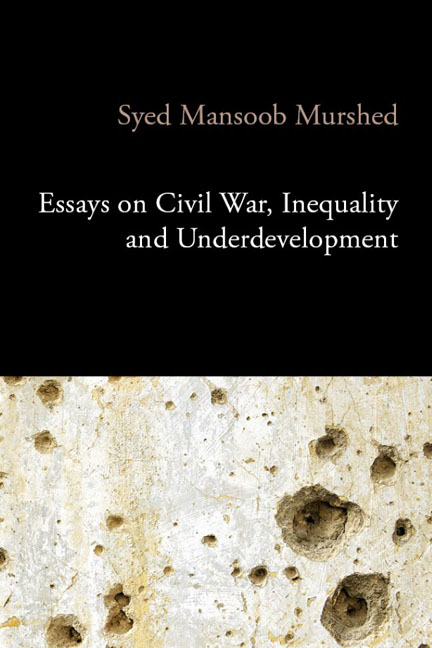Book contents
- Frontmatter
- Contents
- Preface
- Tables and figures
- 1 Conflict, civil war and underdevelopment
- 2 Revisiting the greed and grievance explanations for violent conflict
- 3 Greed, grievance and globalization
- 4 Economic dimensions of the liberal peace and its implications for conflict in developing countries
- 5 Enforcing peace agreements through commitment technologies
- 6 The conflict–growth nexus and the poverty of nations
- 7 Conflict and fiscal capacity
- 8 Does civil war hamper financial development?
- 9 The clash of civilizations and the interaction between fear and hatred
- 10 Transnational terrorism as a spillover of domestic disputes in other countries
- 11 Quantitative restrictions on the flow of narcotics: supply and demand restraints in a North–South macro-model
- 12 Spatial-horizontal inequality and the Maoist conflict in Nepal
- 13 Socioeconomic determinants of everyday violence in Indonesia: an empirical investigation of Javanese districts, 1994–2003
- 14 Not loving thy neighbour as thyself: trade, democracy and military expenditure explanations underlying India–Pakistan rivalry
- Acknowledgements
- References
- Index
4 - Economic dimensions of the liberal peace and its implications for conflict in developing countries
Published online by Cambridge University Press: 09 January 2024
- Frontmatter
- Contents
- Preface
- Tables and figures
- 1 Conflict, civil war and underdevelopment
- 2 Revisiting the greed and grievance explanations for violent conflict
- 3 Greed, grievance and globalization
- 4 Economic dimensions of the liberal peace and its implications for conflict in developing countries
- 5 Enforcing peace agreements through commitment technologies
- 6 The conflict–growth nexus and the poverty of nations
- 7 Conflict and fiscal capacity
- 8 Does civil war hamper financial development?
- 9 The clash of civilizations and the interaction between fear and hatred
- 10 Transnational terrorism as a spillover of domestic disputes in other countries
- 11 Quantitative restrictions on the flow of narcotics: supply and demand restraints in a North–South macro-model
- 12 Spatial-horizontal inequality and the Maoist conflict in Nepal
- 13 Socioeconomic determinants of everyday violence in Indonesia: an empirical investigation of Javanese districts, 1994–2003
- 14 Not loving thy neighbour as thyself: trade, democracy and military expenditure explanations underlying India–Pakistan rivalry
- Acknowledgements
- References
- Index
Summary
Introduction
‘Commerce is the grand panacea’, so argued Richard Cobden (1835), by which he meant the pacific and civilizing effects of international trade and its role in assuaging tensions between nations. In contemporary political science the term liberal peace is employed to explain the absence of fatal conflict between democratic nations that are also economically interdependent. The expression, liberal peace, therefore, has an economic dimension, as well as an element based on a common polity and sets of values. Ultimately, these two strands of the liberal peace are inseparably linked; the literature on the liberal peace, however, may be dichotomized into ideal and economic tendencies. The ideal theory is traceable to Immanuel Kant's notions of foedus pacificum (league of peace) in his essay on the Perpetual Peace (1795) where the simultaneous adoption of a republican constitution generates a cosmopolitan peace. Its modern counterpart is to be found in the contemporary philosopher, John Rawls’ (1999), thought. Economic theories of the liberal peace probably originate in some of Montesquieu's ideas (1748) about the pacific benefits of commerce between peoples; a review of contemporary thinking can be found in Gartzke (2007), where it is labelled the ‘capitalist’ peace. Gleditsch (2008) has outlined a liberal ‘tripod’ where common democratic values, joint membership of international organizations and economic inter-dependence together buttress the ‘liberal’ peace. The term ‘liberal’ internationalist should be underscored in this regard, to distinguish this school of thought from ‘realist’ strands in political science and international relations, or for that matter neo-conservative thinking which also stresses the joint merits of market capitalism and democracy.
While it is an empirical fact that advanced industrialized democracies do not go to war with another, this does not mean that democracies do not engage in wars. For example, according to the Human Security Report (2005), the UK has been involved in the greatest number of inter-state wars (21) during the 1946‒2003 period ahead of France (19) and the USA (16). The Human Security Report also reports the total incidence of (internal as well as inter-state) conflict in different countries.
- Type
- Chapter
- Information
- Essays on Civil War, Inequality and Underdevelopment , pp. 51 - 64Publisher: Agenda PublishingPrint publication year: 2021



